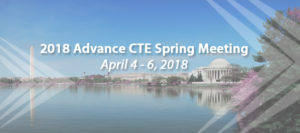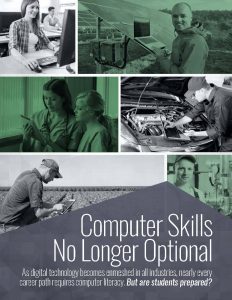This post is written by the Oracle Academy, a Diamon Level sponsor of the 2018 Advance CTE Spring Meeting.
One of the many advantages of being the North America Oracle Academy Regional Director, is the opportunity to spend time ![]() talking with education leaders at the State, K12 District, school site, and post-secondary level from all over the nation. I spend time learning, sharing ideas, celebrating successes, and understanding challenges that these leaders face each day. These conversations and experiences are often the most exciting yet humbling part of my job. February is celebrated as CTE Month and this year, I found myself reflecting on the impact that Career Technical Education (CTE) has on our students both now and in the future. A few thoughts to share are:
talking with education leaders at the State, K12 District, school site, and post-secondary level from all over the nation. I spend time learning, sharing ideas, celebrating successes, and understanding challenges that these leaders face each day. These conversations and experiences are often the most exciting yet humbling part of my job. February is celebrated as CTE Month and this year, I found myself reflecting on the impact that Career Technical Education (CTE) has on our students both now and in the future. A few thoughts to share are:
Reflection #1: CTE continues to evolve to meet changing needs. State and District leadership continue to strive to build sustainable and real-world CTE Pathways that lead our students to college and career success. It’s the CTE leadership that can both anticipate and leverage, through research and relationships, the corporate workforce need and then translate that need into CTE pathways for students to pursue. Many of these pathways include applicable industry certifications, apprenticeship/internships, and defined articulation programs with feeder post-secondary institutions. At Oracle Academy, we work to ensure our resources continue to support the needs of CTE leadership through curriculum and certification opportunities that reflect industry needs.
Reflection #2: Collaboration between local industry and education leadership continue to drive CTE student success. This isn’t a new concept but what I’ve noticed is an uptick in our education and industry leadership working together to create applicable internships, apprenticeships, and mentorships to support the interest of our students. I’ve heard over and over again the importance that these roles play in supporting and creating sustainable CTE programs. At Oracle Academy, our role revolves around building the best classroom resources for the student and teacher so that their content knowledge and often times, confidence, is foundationally strong so that attainment of first time internships and/or apprenticeships are successful.
Reflection #3: A focused effort and persistence will prevail! As we all know, the Carl D. Perkins Career and Technical Education Act is critical to ensuring that quality and sustainable CTE programs meet the changing needs of learners and employers. This act works to improve the academic and technical achievement of CTE students, helps to strengthen the bridge between secondary and post-secondary, and balances the student need with that of a new economy. As parents, educators, and leaders, it’s our duty to encourage organizations, like CareerTech, that advocate on behalf of CTE programs as well as the teachers and students dedicated to CTE success. Oracle Academy supports this mission by continuing to provide our world-class student-facing curriculum and educator professional development – aligned to the IT Career Cluster Pathway – for FREE.
For those of you not familiar, Oracle Academy is Oracle’s flagship program in education philanthropy, currently supporting more than 3.5 million students annually in 120 countries. We advance computing technology education to increase knowledge, skills development, innovation and diversity in computing fields by providing:
- free academic curriculum (database and Java),
- free teacher professional development,
- free software licenses for teaching and academic, not-for-profit research
Two years ago, we introduced Oracle Certified Junior Associate certifications in database and Java; these certification exams align to our Java Foundations and Database Foundations courses and are specifically designed with students in mind to help support internship, summer job, and first job applications.
Oracle Academy exists to improve the computing technology skills of young people, globally! If we strengthen the computing technology pathway between secondary, post-secondary, and career, we are essentially strengthening the future for our children!
Career Technical Education holds a very special place in my heart and I hope this blog reflects both the love and respect that I have for CTE programs and its significant impact on student achievement!




 parents and students to explore their attitudes towards Career Technical Education (CTE). Detailed in the recent report,
parents and students to explore their attitudes towards Career Technical Education (CTE). Detailed in the recent report,  to mechanic’s shop, or in a tractor on a farm.
to mechanic’s shop, or in a tractor on a farm. skills in the issue brief that will be included in your Advance CTE Spring Meeting conference bag.
skills in the issue brief that will be included in your Advance CTE Spring Meeting conference bag. over these five decades and we have learned a few key things about quality during this evolution process—particularly about quality factors associated with standards and credential development. Recent estimates indicate there are over 4,000 industry credentials and roughly 2,000 licenses available for possible utilization in CTE programs. Even if these totals only numbered in the thousands, it would be difficult to determine what credentials should be used for students. In order to help understand the terminology, we wanted to provide some standard definitions which are key components of initiatives in which we are heavily engaged.
over these five decades and we have learned a few key things about quality during this evolution process—particularly about quality factors associated with standards and credential development. Recent estimates indicate there are over 4,000 industry credentials and roughly 2,000 licenses available for possible utilization in CTE programs. Even if these totals only numbered in the thousands, it would be difficult to determine what credentials should be used for students. In order to help understand the terminology, we wanted to provide some standard definitions which are key components of initiatives in which we are heavily engaged.